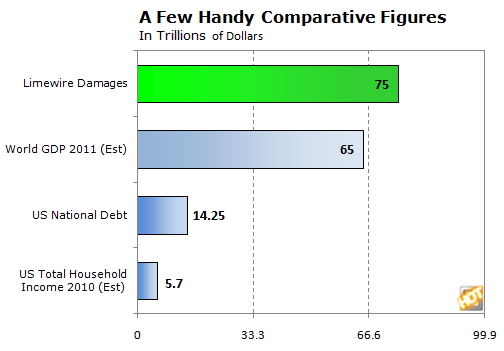Record Labels Claim Limewire Liable For $75 Trillion in Damages
Limewire, the plaintiffs allege, owes them between $400 billion and 75 trillion. The latter, written out, comes to 75,000,000,000,000.
Everyone, meet Jeeves.
When not starring in Tarzan movies or enjoying the finer things in life, he moonlights as an account for the music industry.
We decided to graph a handful of additional values to put the $75 trillion in context. World GDP for 2011 is expected to be ~$65 trillion, the US national debt is currently $14.25 trillion, and the total median income for all 114,825,428 US households in 2010 is just $5.7 trillion. In other words, every single US household would have to spend all of its income buying nothing but music for over 13 years in order to arrive at what the music industry has deemed a reasonable settlement. Even the lower figure of $400 billion still amounts to seven percent of total household income in the entire country.

The alternative reading is that the plaintiffs are only eligible to recover statutory damages based on the number of songs shared. If Limeware shared 100 songs, as above, it would be required to pay damages of $10 per song or $1000 total. The enormous gap between these two figures is a genuine problem for modern copyright law. Judge Wood writes: "To the best of this Court's knowledge, the issue of whether a plaintiff should be able to recover from a secondarily liable defendant multiple awards per work based on the number of direct infringers... has never been addressed in a context where the secondarily liable defendant has enabled hundreds, if not thousands, of individuals to infringe."
Having acknowledged the problem, she rules that the plaintiffs are only eligible to recover a single statutory reward per work infringed. One of the strongest arguments against the claim that Limewire owes up to $75 trillion is that it violates the judicial precept of absurdity. In arguing that Limewire should be eligible for damages on every individual download, the studios were effectively arguing that Limewire owed it more money than the entire record industry has made since Edison invented the phonograph in 1877.
This decision is important because it both acknowledges a legitimate gap in copyright law while slapping down the recording industry's blatant stupidity. It's incredibly ironic that the music studios, who unquestionably have the most to gain from balanced copyright law that addresses digital media while maintaining fair use, instead paint themselves in motley. Even if Wood had agreed with their logic, no higher court would have allowed a $400 billion fine to stand against one company. Ridiculous moves like this leave us wondering how sincere the music industry is when it speaks of finding common ground.

